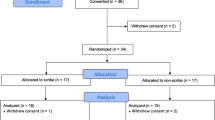Abstract
Introduction
Many US pre-health professional students prepare for applying to medical training by transcribing clinician-patient encounters. Scant literature of the effects of scribing experiences before starting medical training exists. We conducted a study to investigate student perspectives about medical scribing’s educational impact on clinical skill development.
Methods
Using a mixed-methods approach, medical and physician assistant students were surveyed and interviewed about clinical experiences and confidence before entering medical training, and the impact of scribing on clinical skills learning. Thematic analysis revealed salient themes in participants’ perspectives on the scribing experience.
Results
A total of 214 (33%) of the 658 students completed the survey; 66 (31%) had scribing experience. Scribes were more confident (p ≤ 0.001) in clinical note writing and history taking than non-scribes. Thematic analysis revealed perceptions that scribing impacted clinical note writing, medical knowledge, communication, and healthcare environment functioning.
Discussion
Findings suggest that the scribing experience affects confidence and perceived skills, particularly clinical note writing. Future research could explore the impact on clinical skill development through comparative performance-based assessment.
Conclusion
Measuring the impact of scribing before entry to medical/physician assistant school on clinical skill development could provide directives for best approaches to clinical skills education in health professionals training.

Similar content being viewed by others
References
Pearson E, Frakt A. Medical scribes, productivity, and satisfaction. JAMA. 2019;321(7):635–6.
Platt J, Altman W. Can medical scribes improve quality measure documentation? J Fam Pract. 2019;68(5):E1-e7.
Yan C, Rose S, Rothberg MB, Mercer MB, Goodman K, Misra-Hebert AD. Physician, scribe, and patient perspectives on clinical scribes in primary care. J Gen Intern Med. 2016;31(9):990–5.
Hess JJ, Wallenstein J, Ackerman JD, et al. Scribe impacts on provider experience, operations, and teaching in an academic emergency medicine practice. West J Emerg Med. 2015;16(5):602–10.
Bank AJ, Obetz C, Konrardy A, et al. Impact of scribes on patient interaction, productivity, and revenue in a cardiology clinic: a prospective study. Clinicoecon Outcomes Res. 2013;5:399–406.
Taylor KA, McQuilkin D, Hughes RG. Medical Scribe Impact on Patient and Provider Experience. Mil Med. 2019;184(9–10):388–93.
Hafer J, Wu X, Lin S. Impact of scribes on medical student education: a mixed-methods pilot study. Fam Med. 2018;50(4):283–6.
DeWitt D, Harrison LE. The potential impact of scribes on medical school applicants and medical students with the new clinical documentation guidelines. J Gen Intern Med. 2018;33(11):2002–4.
Lin KY, Parnami S, Fuhrel-Forbis A, Anspach RR, Crawford B, De Vries RG. The undergraduate premedical experience in the United States: a critical review. Int J Med Educ. 2013;4:26.
Paolino ND, Artino AR, Jr., Saguil A, Dong T, Durning SJ, DeZee KJ. Predicting medical school and internship success: does the quality of the research and clinical experience matter? Military Medicine. 2015;180(suppl_4):12–17.
Artino AR, Gilliland WR, Waechter DM, Cruess D, Calloway M, Durning SJ. Does self-reported clinical experience predict performance in medical school and internship? Med Educ. 2012;46(2):172–8.
Crabtree BF, and Miller, William L. Doing qualitative research. Newbury Park, California: Sage Publications; 1992.
Nvivo 10 Qualitative data analysis software [computer program]. Version 10. Doncaster, Victoria, Australia: QSR International Pty Ltd. 16; 2014.
Bombeke K, Van Roosbroeck S, De Winter B, et al. Medical students trained in communication skills show a decline in patient-centred attitudes: an observational study comparing two cohorts during clinical clerkships. Patient Educ Couns. 2011;84(3):310–8.
Brown J. Transferring clinical communication skills from the classroom to the clinical environment: perceptions of a group of medical students in the United Kingdom. Acad Med. 2010;85(6):1052–9.
Shibli-Rahhal A, Brenneman A, McVancel M, Rosenbaum M. A practical approach to integrating communication skills and early clinical experience into the preclinical medical school curriculum. Medical Science Educator. 2019;29(4):947–57.
Skelly K, Rosenbaum M, Barlow P, Priebe G. Comparing resident-patient encounters and case presentations in a family medicine clinic. Med Educ. 2019;53(7):677–86.
Kihm JT, Brown JT, Divine GW, Linzer M. Quantitative analysis of the outpatient oral case presentation: piloting a method. J Gen Intern Med. 1991;6(3):233–6.
Cali DD, Estrada C. The medical interview as rhetorical counterpart of the case presentation. Health Commun. 1999;11(4):355–73.
Klos M, Reuler JB, Nardone DA, Girard DE. An evaluation of trainee performance in the case presentation. J Med Educ. 1983;58(5):432–4.
Funding
This study was funded by the University of Iowa Roy J. Carver College of Medicine Summer Research Fellowship Program.
Author information
Authors and Affiliations
Corresponding author
Ethics declarations
Ethical Approval
Institutional Review Board approval was obtained for this study, #201403757.
Informed Consent
Informed consent was obtained.
Conflict of Interest
The authors declare no competing interests.
Additional information
Publisher's Note
Springer Nature remains neutral with regard to jurisdictional claims in published maps and institutional affiliations.
Rights and permissions
About this article
Cite this article
Skelly, K., Weerasinghe, S., Daly, J. et al. Impact of Medical Scribe Experiences on Subsequent Medical Student Learning. Med.Sci.Educ. 31, 1149–1156 (2021). https://doi.org/10.1007/s40670-021-01291-1
Accepted:
Published:
Issue Date:
DOI: https://doi.org/10.1007/s40670-021-01291-1



